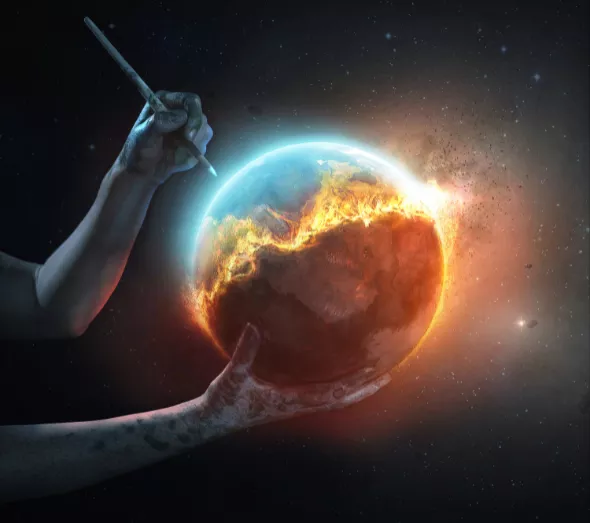This is the first in a series of articles on commonalities across religions. In the introductory article for this series, we refer to these commonalities as “common threads” because they are woven throughout human history and reflect the fact that we are all made of the same fabric. However, there is great diversity and beauty in the many different colors of dye observed across cultures and belief systems.
An important factor in why we see these common threads across very different cultures lies in our shared evolutionary past. Early human communities, regardless of their geographical locations, all were facing similar environmental and existential conditions. All of us today share this common evolutionary past, along with over 99% of the same DNA and the same basic cognitive makeup.
Imagine yourself as one of the earliest humans or proto humans, long before the birth of civilization as we know it. The world must have been a frightening and mysterious place. In addition to the constant fear of being eaten by predators, the Earth itself was threatening and hostile, with its constant fluctuations in weather and its unforgiving natural disasters.
Human knowledge had not advanced far enough to account for exactly what caused these forces, but the human brain had evolved skilled enough mechanisms of pattern recognition to realize that such events were not random — something must be causing them to happen, and our survival as early humans depended upon our ability to understand these agents of causation.
Early forms of human religions like animism and totemism explained aspects of the natural world — the sun, the stars, the skies, the rain — in terms of what we would now call “gods,” which were the controlling forces behind everything.
It wasn’t long before the concept of a “higher power” emerged. Could there be one controlling force that reigned over all the others, much like a human leader reigned over the tribe? If so, then appeasing this higher power would in theory appease all (or at least many) others.
Through both biological and cultural evolution, the feeling that there must be a higher power, and the compulsion to seek it out, became deeply embedded in our psyches as a shared meaning-making impulse.
This is why, according to a Pew Research poll from 2018,
“Only one-in-ten Americans say they don’t believe in God or a higher power of any kind,” and “among those who describe themselves as religiously unaffiliated — also known as ‘nones’ — 72% say they believe in a higher power of some kind.”
For Jews, Christians, and Muslims, the higher power is a conscious being who created the entire universe. But believing in a higher power does not require believing in the Judeo-Christian God specifically, nor does it require belief in any gods at all.

In the Chinese religions of Daoism and Confucianism, the conception of a higher power is somewhat agnostic. The Daoist sage Lao Tzu reasons that there must be some higher power, but that it is indescribable and can only be observed and understood indirectly:
“Imagine a nebulous thing
Here before Heaven and Earth
Subtle and elusive
Dwelling apart and unconstrained
It could be the mother of us all
Not knowing its name
I call it the Tao.”
In Hinduism, consciousness is often described as a higher power, an infinite reservoir of knowledge and wisdom. Eknath Easwaran, a translator of Indian classical texts, describes this focus on consciousness as follows:
“By knowing one piece of gold,” the Upanishads observed, “all things made out of gold are known: they differ only in name and form, while the stuff of which all are made is gold.” And they asked, “What is that one by knowing which we can know the nature of everything else?” They found the answer in consciousness. Its study was called brahmavidya, which means both “the supreme science” and “the science of the Supreme.”
And for Buddhists, there is a similar emphasis on a particular type of mind. The Buddhist monk and poet Shantideva describes the concept of bodhicitta (“enlightenment mind”) with the reverence and awe befitting of a higher power:
“All other virtues, like the plantain tree,
Produce their fruit, but then their force is spent.
Alone the marvelous tree of bodhicitta
Constantly bears fruit and grows unceasingly.”
These various conceptions of higher powers represent a great diversity of belief and reasoning across human cultures. But underlying these differences in belief is a fundamental commonality in praxis, as all are part of the same activity of meaning-making. We are all asking the same questions in similar ways because our nervous systems all share the same basic structures, which predispose us to see the universe around us through the logic of causality, just like all of our ancestors.
There is much that we still do not understand about ourselves and the universe we exist in. We may have gotten better at manipulating the physical world, but we still do not know why we exist in the first place or why anything exists at all or what existed before the birth of our universe. These deeper existential mysteries keep our meaning-making impulses alive, which is why neither belief in a higher power nor religion itself are disappearing anytime soon.
If we understand religions as humanity’s efforts toward meaning-making, it becomes clear that all religions start to make sense when looked at metaphorically and when situated in their historical contexts, but no one can claim to be the sole possessor of ultimate truth. The infinity of existence is typically too big for our cognitive abilities to grapple with, although the great prophets and sages do seem to have tapped into a more expansive state of consciousness which has revealed to them a more expansive view of the universe.
We get closer to the truth when we piece together our different perspectives, embracing the diversity of our ideas and beliefs, weaving together tapestries of many different colors. This is what we are attempting to do by highlighting so many common threads across religions. Next in our series will be the common thread of seeing Order in the Universe.



